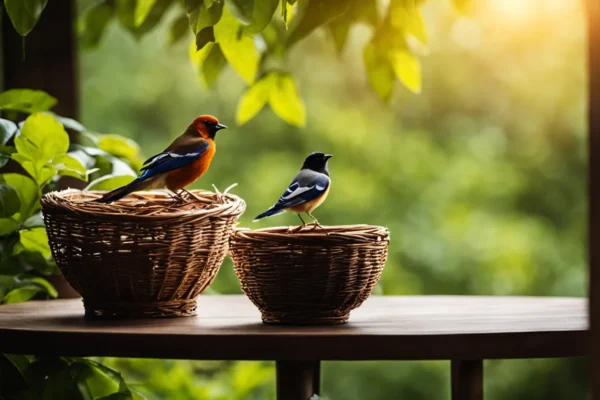Of all the swallow species, barn swallows are the most common, and being little birds, they have the widest natural range of any songbird in the world.
Barn swallows are a beloved bird that marks the entrance of spring and the end of winter in many areas of the world. They are distinguished by their unique forked tail and blue coat, and they are well-known for their amazing flying abilities.
Although swallows eat a variety of foods, they are classified as insectivores since flying insects account for 99% of their diet. When they have babies in the nest to feed, they will especially spend hours darting about snatching up insects. They capture on the fly. The insects that swallows consume are determined by their migration. Swallows do not eat at night, only during the day.
Swallows are nature’s acrobats, capable of the most amazing aerobatic feats. They also have no trouble seeing food sources in the air while in the air.
A swallow’s dietary restrictions are often brought on by changes in the climate that restrict or change the amount of insect life that is accessible.
What kind of insects feed swallows?
Depending on whether the swallow is in the UK, North America, or Europe, its diet will change. These are a few of the insects that swallows consume:
Wasps
Mosquitoes
Bees
Hornets, Dragonflies, and Flies
Gnats, flying ants
Horseshoe crabs
Butterflies
The houseflies
In addition, caterpillars, grasshoppers, crickets, spiders, snails, and worms are all consumed by swallows.
How are insects caught by swallows?
The large, broad mouth and beak of swallows make them perfect for gathering insects in midair. The small rictal hairs that line the beak assist guide the insects into the swallow’s open mouth.
Because of their incredible aerobatic abilities, swallows may employ a variety of flying patterns and maneuvers to capture almost any insect on the wing. The insects that are present will determine how they fly, and weather patterns are intimately related to insect populations.
Swallows, who consume an average of 60 insects per hour, are often regarded as nature’s natural pest remover. However, swallows also consume insects, like butterflies and bees, who are welcome guests in gardens.
Swallows may hunt lower on humid days because different weather conditions create flying insects at different heights. However, on clear, bright days, they can fly far higher into the sky to search for food and compete with other birds like swifts.
Are swallows feeding on birdseed?
While they do consume bird seed, swallows are not particularly fond of backyard bird feeders since they would rather search for food and eat while in flight than stand still.
A swallow may sometimes land on the ground to nibble seed, however, they may be in danger from predators such as domestic cats and birds of prey.
Because there are so many different kinds of insects, swallows seldom need to search further than what they can capture on the fly. If insects become scarce, they will just turn to other food sources.
Eat mealworms, swallows?
Swallows do not naturally eat mealworms, but they may be convinced to do so if their normal food supply becomes insufficient.
Do swallows consume hives?
Swallows do consume bees, and they often choose to capture bigger insects since the nutritional value of a large insect outweighs its energy cost. Swallows do, however, tend to avoid stinging insects and will only feed on bees, wasps, and hornets when their usual food supply is threatened.
Which fruit is eaten by swallows?
Occasionally, swallows may consume strawberries. If blackberries are available early and they haven’t moved, they may also treat themselves to a few luscious, plump berries.
What nourishes young swallows?
During their one-month-long stay in the nest, baby swallows get constant feedings from their parents.
In general, baby swallows are largely fed insects. When there is a clutch of chicks to feed, the adults have to work much harder to meet the needs of the feeding program since both parents feed the young and bring back some of the food they collect. In colder climates, where early nests may face difficulties in cold springs, adult swallows may search for berries or any other food source to nourish their offspring.
If swallow chicks are not fed enough because of their environment, they may not survive.
Do swallows consume the eggs of other birds or their young?
It is rare for swallows to consume eggs from other species. Barn swallows, when they are single males, can murder and consume other juvenile birds to break up the resident couple of adults so they can attract and mate with the female.
What foods avoid swallows?
Tadpoles and other insects related to water or pond life are not often consumed by swallows.
What more food do swallows consume?
To help with digestion, barn swallows may add a small quantity of grit or eggshells to their meal of insects.
In quest of warmer climates and an abundance of insects, barn swallows move 6,000 miles to Africa when their food supply in the UK dries up in the fall.
How are drinks made for swallows?
Swallows locate a level in the sky where water is accessible and drink while flying. As they perch or skim low over water sources like puddles, ponds, and rivers, they will also collect rainfall.
Can I give swallows anything?
Swallows may be drawn to open feeder platforms or the ground by seed and berries, but the real draw is the greenery and flora, which stimulate an abundance of insects, the swallows’ natural food source.


![22 Astonishing Birds with Red Breast [With Pictures]](https://birdsology.com/wp-content/uploads/2022/08/21-600x400.jpg)
![Can Birds Have Heart Attacks? [Explained]](https://birdsology.com/wp-content/uploads/2024/01/14824.webp-600x400.webp)


